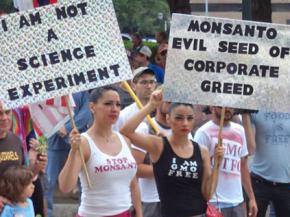Protesting the “gene giants”
reports from Texas on the international March Against Monsanto.
PROTESTERS IN six continents, 50 countries, 47 U.S. states and 400 cities took part in the international March Against Monsanto on March 24. Activists' demands included a ban on GMOs (genetically modified organisms)--or, at the very least, the right to reject GMOs with mandatory labeling.
In Austin, Texas, some 400 people turned out for a march and rally at the state Capitol, their signs reflecting a deep concern that the right to a safe food supply was slipping from their grasp. Approximately 90 percent of corn and soybeans in the U.S. is genetically modified, and transgenic plants are known to invade other crops and transmutate.
Children of all ages--those whose smaller bodies suffer most from a corrupted food supply--made up a large portion of the Austin protesters. They carried signs and sang of the need for and right to clean food.
Tami Monroe Canal, one of the initiators of the international march, argues that GMOs were put on the market without long-term, independent, peer-reviewed studies. Evidence continues to grow about the lack of safety of genetically modified crops--and the speed of the revolving door that sends executives from Monsanto officials to the FDA and EPA increases with each attempt of the public to gain some control over what they eat.

In 2012, California's Proposition 37 calling for mandatory labeling of GMOs in food was narrowly defeated despite Monsanto's immense spending to squash it.
On May 8, Vermont became the first state to pass a GMO labeling law, and the state is prepared for what they feel is an inevitable lawsuit. The Grocery Manufacturers Association, a name that is popping up frequently these days whenever people organize to know and control what is in the food they are eating, has threatened to sue.
Two weeks later, two Oregon counties--Jackson and Josephine--passed countywide bans on growing GMOs. Monsanto and other GMO groups spent a record $1 million to defeat the measure in just Jackson County. Jackson County's ban appeared on the ballot before Oregon Senate Bill (SB) 863 pre-empting GMO bans, but Josephine County's ban is at risk.
Oregon's Ballot Initiative 44 requiring statewide mandatory labeling of GMO foods comes to a vote in November. The California Senate has taken up the issue again with SB 1381, and passage looks promising.
Individuals and smaller groups are organizing petition drives against national and local grocers.
An official from H-E-B, the de facto monopoly grocery behemoth in Texas, had promised organizers of the Austin rally he would appear at the event to accept several online and on paper signatures demanding GMO labeling on products sold in the H-E-B stores. Not surprisingly, he didn't show.
Petitions against certain products pop up on the Internet, such as the one demanding that a Greek yogurt product stop feeding GMO grains to its milk-producing cows.
More than 60 countries around the world have some type of ban or mandatory labeling of GMOs and certain food additives. Clearly Monsanto and other "gene giants" are losing the public relations battle to the public's desire to have a meal uncorrupted by weird additives and altered organisms they find hard to comprehend and difficult to pronounce.
Meanwhile, as a speaker at the Austin rally pointed out, government officials are working as unobtrusively as possible to pass a couple of free trade agreements that are anything but free: the Trans-Pacific Partnership and the Trans-Atlantic Free Trade Area (or the Trans-Atlantic Trade and Investment Partnership).
These agreements would make it impossible--and probably illegal--for an individual standing anywhere on the globe to know not only what nefarious additive is lurking in his lunch but where in the world is its point of origin.
The right to know and the right to a safe food supply are basic human rights. It's a battle that we must win.


